You don’t necessarily need to stop your fitness routine during fertility treatment, but you may consider making some mindful modifications. Shady Grove Fertility physician Dr. Jaimin Shah encourages his patients to keep up with their regular workouts with a few modifications and exceptions if their bodies are feeling up for remaining active throughout fertility treatment. We spoke with Dr. Shah about all things exercise and fertility.
What activities can I do during fertility treatment?
During fertility treatment, trust your comfort levels for activity and check in with your physician for their recommendations. This might not be the best time to kick off a brand-new workout routine but if you are already comfortable and consistent with activity, you are welcome to keep it up as your body allows. It’s possible there will be some days you aren’t feeling up to being active, and that is okay too.
“The best recommendation I have for patients is to listen to their bodies throughout the treatment cycle to guide their levels of activity,” shares Dr. Shah. “There are many low-impact activities that you may find helpful throughout treatment like walking, stationary weights, leisurely cycling, and stretching.”
What concerns are there about exercising during fertility treatment?
The main concern surrounding activity during treatment such as in vitro fertilization (IVF) is ovarian torsion, which is an uncommon but serious condition that causes the ovary and sometimes the fallopian tube to twist on the tissues that support them. During IVF, the ovaries are much larger than usual due to growing more follicles than a regular menstrual cycle, so the risk for ovarian torsion, while still rare, is increased.
While exercising during fertility treatment, keep the growing ovaries in mind. Consider skipping a high-intensity workout or other activities that ask your body to twist or go upside down.
How long should you refrain from working out after an embryo transfer?
For the first 24 hours after an embryo transfer, your physician may have certain activity restrictions. Every case is unique, so please check in with your physician for their guidance.
In many cases, you will be asked to do 24 hours of “couch rest” after the embryo transfer – take the day off, put your feet up, and rest as much as possible.
After the first 24 hours, you may need to continue to take it easy for an additional three to four days. You can go back to work and lead your normal life, but strenuous exercise, chores, and even sexual relations and intercourse should be avoided.
“Once an embryo is transferred into the uterus, it usually takes a day or so to attach to the uterine wall,” shares Dr. Shah. “The embryo and the uterine lining have receptors that are made to find each other. When they meet, they stick to each other. So, take it easy after a transfer, but rest assured, implanted embryos won’t just unstick because of your exercise routine.”
Should other lifestyle adjustments be made during fertility treatment?
While it’s very important to have healthy lifestyle habits while pregnant, these same behaviors are just as important when you’re trying to conceive. During fertility treatment, you should eliminate risky behaviors like excessive drinking and smoking of any kind. You should also make sure your physician is aware of any prescription medications you are taking.
Visit Shady Grove Fertility’s comprehensive resource library for more information surrounding your fertility and family-building care. To schedule a consult with a fertility specialist, call SGF’s New Patient Center at 1-877-971-7755 or complete this brief form.
Medical contribution by Jaimin S. Shah, M.D.
Jaimin S. Shah, M.D., is board certified in obstetrics and gynecology (OB/GYN) and board eligible in reproductive endocrinology and infertility (REI). He completed his residency training in OB/GYN at the McGovern Medical School in Houston, Texas. During this time, Dr. Shah was inspired by a patient diagnosed with breast cancer and found working with a reproductive endocrinologist (REI) to help preserve the patient’s future fertility a fulfilling experience.







